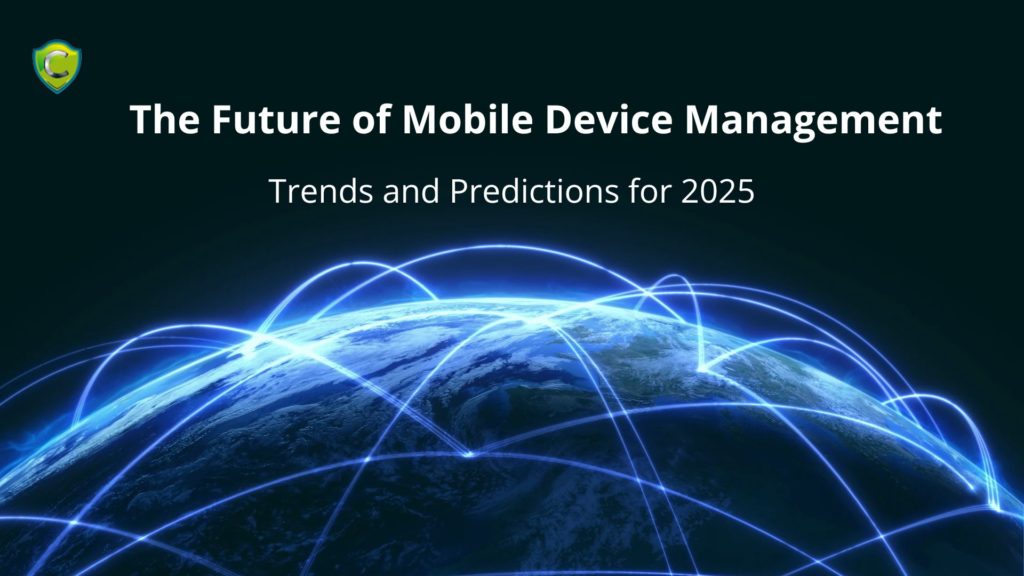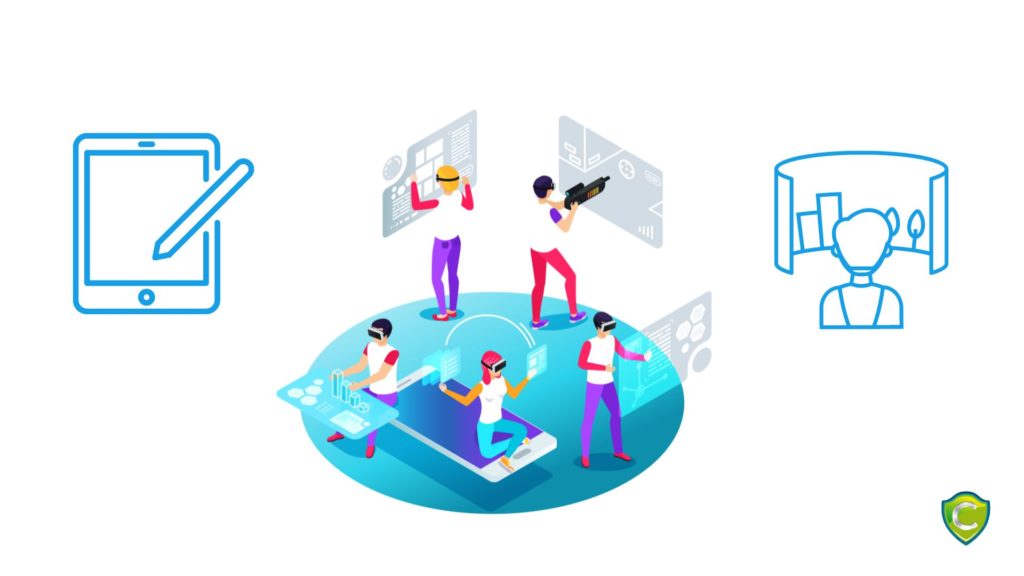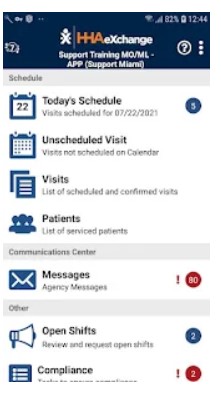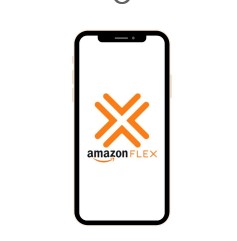
The world of Mobile Device Management, also known as MDM, is changing faster than ever, thanks to rapid advancements in technology and the shifting needs of businesses. As we head towards 2025, some interesting trends are emerging that will shape the future of MDM/UEM. We’re talking about AI integration, cutting-edge security features, enhanced remote management capabilities, and so much more. To meet the competing demands 28% of hardware decision-makers indicate they will invest in the UEM (Unified Endpoint Management)
Cybersecurity Features
With cyber threats becoming increasingly sophisticated, real-time threat detection and scanning are crucial. Products like Cyber Device Manager ® offer advanced security features that protect devices from potential threats, ensuring data security and compliance.
As regulatory requirements become more stringent worldwide, including in countries like India, businesses must ensure compliance with standards such as HIPAA. MDM/UEM solutions are incorporating features to meet these regulatory demands, safeguarding sensitive information and ensuring legal compliance.
Authentication & Authorization
The importance of robust authentication and authorization mechanisms is growing. Modern security practices, such as single sign-on (SSO) and multifactor authentication (MFA), have become standard. These methods not only enhance security but also streamline user access and management processes, reducing the risk of unauthorized access and potential data breaches.
Data Privacy and Compliance
Due to geopolitical factors and sanctions, companies are prioritizing the need to keep data within their own countries and are seeking local data centres to ensure compliance. Recent regulations, such as GDPR and other privacy laws, have made these requirements mandatory. For instance, healthcare companies in the USA must comply with HIPAA regulations to protect patient information. Ensuring data privacy and regulatory compliance is now a crucial aspect of any business operation.
Remote Workforce Management
Furthermore, the rise of remote work has increased the dependency on effective helpdesk management, particularly for mobile devices. Remote employees often face technical issues that can impede productivity, making efficient and responsive support essential. MDM/UEM solutions now integrate advanced helpdesk features, enabling IT departments to remotely troubleshoot and resolve issues on mobile devices quickly. Capabilities such as remote access, real-time monitoring, and automated alerts allow IT teams to proactively manage and support a distributed workforce, minimizing downtime and maintaining operational efficiency. The ability to provide immediate assistance regardless of geographical boundaries is crucial in sustaining the productivity and morale of remote employees.
The shift towards remote and hybrid work environments has amplified the importance of remote management. Cyber Device Manager ® enables businesses to manage devices efficiently, regardless of location, ensuring seamless operations and productivity.
Geopolitical Challenges and Data Privacy Compliance
In 2025, the landscape of remote work continues to evolve, influenced heavily by geopolitical factors and an increasing emphasis on data privacy. Organizations around the globe have adapted to a more distributed workforce, which has brought cybersecurity and helpdesk management to the forefront of the unified endpoint management industry. With employees accessing sensitive corporate data from various locations on their mobile devices, ensuring the integrity and security of this data has become paramount. Cyber threats have become more sophisticated, and the potential for data breaches has grown, prompting companies to invest heavily in robust MDM/UEM solutions that offer comprehensive security features, such as encryption, secure access controls, and real-time threat detection.
Geopolitical tensions can lead to varying data sovereignty laws, requiring companies to comply with multiple, sometimes conflicting, legal frameworks. This has driven the demand for MDM/UEM solutions that can seamlessly enforce data privacy policies on mobile devices, regardless of where they are located. Features like location tracking and content filtering are now critical, allowing organizations to restrict access based on geographic location and ensure that only approved content is accessible. These capabilities not only protect corporate data but also ensure compliance with regional data privacy laws, mitigating the risk of legal repercussions. Data privacy concerns have been magnified by differing international regulations and standards. This shift necessitates MDM/UEM solutions that can adapt to diverse and evolving regulatory environments, providing organizations with the flexibility to maintain compliance without compromising on security.
Support for Advanced Technologies
With the rise of augmented reality (AR) glasses, smartwatches, and other wearable devices, MDM/UEM solutions are evolving to support a wide range of technologies. Platforms like Codeproof Cyber Device Manager ® provide comprehensive management for these devices, ensuring they are secure and well-maintained. The evolution of wearable technology, from wired earphones to wireless smartwatches and AR glasses, has created new opportunities for MDM/UEM. These devices can now be managed and supported through comprehensive UEM solutions, ensuring they function optimally and securely.

Customization of Features for different Industries
Home Healthcare
An MDM/UEM platform offers HIPAA-compliant security through data encryption and data leakage prevention. In home healthcare, nurses carry phones with the nursing app HAeXchange for clock-in and clock-out

Logistics and Last Mile Delivery
Platforms like Amazon Flex utilize Mobile Device Management (MDM) or Unified Endpoint Management (UEM) in kiosk modes to streamline their operations by restricting devices to a single application or a specific set of functions. This ensures that delivery personnel can only access essential apps, reducing distractions and enhancing focus on the task at hand. By controlling device usage, companies can enforce compliance with company policies, secure sensitive data, and prevent misuse. MDM/UEM solutions offer advanced capabilities, such as real-time tracking, remote management, and application control, which are critical for maintaining operational efficiency and productivity. Centralized control reduces the risk of errors and allows for quick updates and troubleshooting, ensuring that all devices remain aligned with business objectives and regulatory requirements.

Evolving Use Cases and Broader Adoption
From Large Enterprises to Small Businesses:
UEM is no longer limited to large enterprises; small businesses and even shopkeepers are adopting these solutions to manage their devices. A research paper published by a thinktank named Grand View showcased the growing market of MDM/UEM
Managing Online Tests:
Educational institutions are also leveraging MDM/UEM to prevent cheating in online tests, ensuring the integrity of the examination process. Edu-tech giants like Byju and Vedantu are using i to manage tablets provided to students, ensuring a controlled and secure learning environment.
End-User Device Management:
MDM/UEM solutions now support a variety of end-user devices, including hospital remote access systems and educational tablets. This flexibility allows organizations of all sizes to implement effective device management strategies.
AI Integration in MDM
AI integration in MDM/UEM is revolutionizing the field by offering real-time support and troubleshooting. AI-powered chatbots provide 24/7 assistance, handling generic queries and reducing customer service downtime, which ensures continuous support and enhances customer satisfaction. These AI-driven systems can access vast amounts of information to provide instant answers to user queries, and they also aid in data collection, offering insights into device usage patterns and user behavior. Additionally, AI-powered chatbots provide multilingual support, enabling businesses to cater to a global audience and meet the unique demands of users in diverse regions, ensuring effective communication and support.
So, now you know the future of Mobile Device Management is looking brighter than ever! With AI integration, advanced security features, and enhanced remote management capabilities leading the way, businesses that embrace these trends will be well-equipped to navigate the ever-evolving digital landscape. Solutions like Codeproof Cyber Device Manager ® are paving the way, offering the tools you need to manage your devices efficiently and securely in 2025 and beyond.
AI integration in MDM/UEM is revolutionizing the field by offering real-time support and troubleshooting. AI-powered chatbots provide 24/7 assistance, handling generic queries and reducing customer service downtime, which ensures continuous support and enhances customer satisfaction. These AI-driven systems can access vast amounts of information to provide instant answers to user queries, and they also aid in data collection, offering insights into device usage patterns and user behavior. Additionally, AI-powered chatbots provide multilingual support, enabling businesses to cater to a global audience and meet the unique demands of users in diverse regions, ensuring effective communication and support.
So, now you know the future of Mobile Device Management is looking brighter than ever! With AI integration, advanced security features, and enhanced remote management capabilities leading the way, businesses that embrace these trends will be well-equipped to navigate the ever-evolving digital landscape. Technology is paving the way, offering the tools you need to manage your devices efficiently and securely in 2025 and beyond.
Ready to stay ahead of the curve? Explore the capabilities of modern MDM/UEM solutions like Codeproof and prepare your business for the future of mobile device management. Here’s to a more secure, efficient, and innovative future!

